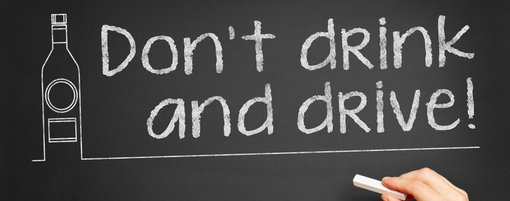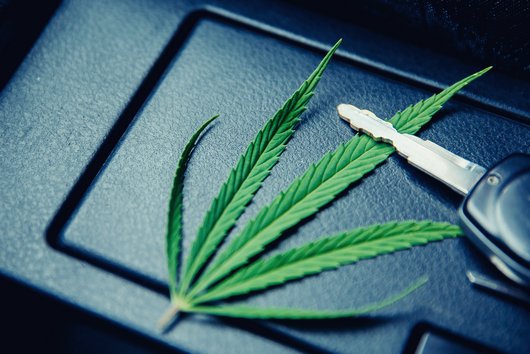Alcohol, drugs and medication
According to the Federal Statistical Office, more than 20,000 traffic accidents occur every year in Germany in which alcohol, drugs or medication played a role. Often, novice drivers in particular underestimate the effects of consumption on their own ability to drive.
You not only endanger yourself, but also your fellow human beings in road traffic. About 300 people die each year from drink-driving alone. In addition to the health risks, the whole thing can also have legal consequences. In this article you will find the most important information.

Alcohol and its effects
Even small amounts of alcohol (from 0.3 % per mille) influence your central nervous system. Alcohol consumption is therefore always the cause of traffic accidents, some of which result in considerable damage to property and/or personal injury:
- Your reaction time s increasing.
- You hear worse (directional hearing).
- Your self-criticism wanes, inhibitions are reduced.
- Your willingness to take risks is increasing.
- You'll get blinded more easily.
- Your perception of space and depth is diminishing.
- It's hard for you to estimate distances.
- It is difficult for your eyes to adapt to changed light (light-dark).
- Your brain takes longer to process information.
- You can't coordinate your movements properly anymore.
- You can no longer estimate your speed and distances correctly.
- You misjudge dangerous situations.
- You're driving more inattentively.
- You get aggressive fast.
You have to keep that in mind:
How long does the alcohol stay in the body?
The breakdown of alcohol in the body takes place about 90% by the liver and beyond that very slowly. In a healthy body, an average of 0.1 per mille per hour is broken down. You will often find tips and tricks on the Internet or in everyday life on how to speed up this degradation process. You shouldn't trust that! Even sleep or so-called "soberers" such as coffee, walking, fresh air or sports cannot influence the degradation.
What happens when I get drunk driving?
Anyone who drives a vehicle unfit to drive commits a criminal offence. The legislator differentiates between the following limit values:
0.0 per mille:
All novice drivers during the probationary period and young drivers up to the age of 21 are subject to an absolute ban on alcohol. An infringement leads to a fine, to the arrangement of a driving aptitude seminar and to points in the driving aptitude register.
0.3 per mil:
This is referred to as relative driving incapacity with failure symptoms such as driving wavy lines, particularly slow driving on wide roads or accidents.
Depending on whether the incident had no consequences, led to a concrete danger or even to an accident, a conviction for drunk driving (§ 316 StGB) or for endangering road traffic (§ 315c StGB) can be considered.
0.5 per mil:
Although one is usually still fit to drive with 0.5 per mille, one commits an administrative offence as a result. This behaviour is punished with a fine, driving ban and points in the driving aptitude register.
1.1 per mil:
In this case you are absolutely unfit to drive and are liable to prosecution for drunk driving (§ 316 StGB) or - in the event of an accident or near-accident - for endangering road traffic (§ 315c StGB).
This can result in a fine or imprisonment of up to 5 years, the driver's license is revoked and points are entered in the driving aptitude register.
Especially as a beginner driver, stick to the following rules!
Alcohol is widely accepted in our society. However, the problem of "alcohol in road traffic" must by no means be ignored. It is above all the gradual loss of control that makes alcohol consumption so dangerous for road traffic.
Therefore, adhere to the following principles:
- Drive to parties where it's already clear in advance that alcohol is being drunk, not even by car.
- First, find out who's driving and not drinking alcohol with it.
- Don't ask the driver to join you.
- Never get in a car with an alcoholic driver.
- Call a taxi, get picked up or use public transport if you have consumed alcohol.
- Keep drunken people from driving - that might save you a life!
Illegal drugs
Every year almost 1,500 traffic accidents occur in Germany in which illegal drugs play a role. Not only alcohol, but also narcotics can have a considerable and long-lasting influence on your driving ability. They can also be addictive. Even a single use of cannabis, ecstasy, speed, opiates, hallucinogens or cocaine can lead to unfitness to drive.
Effects:
- attention and concentration disorder
- misjudgements
- Decreasing danger awareness
- sensory disturbances of time
- Perception and coordination disorders

That applies to driving under the influence of drugs!
How are the limit values regulated?
In the case of illegal drugs there are no legal limits, as in the case of alcohol, above which a relative or absolute driving incapacity can be assumed. This is mainly due to the fact that the effect is very different and strongly depends on the respective person and their constitution.
Also the degradation of the substances does not proceed in a straight line as with alcohol, but unevenly and temporally difficult to estimate.
For this reason, the zero tolerance rule applies to driving drugs. Any evidence of drug influence, however slight, is therefore sufficient, regardless of whether it has already impaired driving ability or not.
How does the legislator react to drugs at the wheel?
The detection of certain drugs in the blood leads to fines, points in the driving suitability register as well as to a driving ban. Irrespective of this, any violation of the Narcotics Law is punishable by law.
If you, as a driving licence applicant or novice driver, are even suspected of having (been) a drug user, the driving licence office may ask you to prove your freedom from drugs by means of a medical-psychological examination (MPU).
If you have a driving licence and are a drug user, it will be difficult for you to keep your driving licence or - if it has been revoked - to get it back.
Driving licence taken for drugs - How do I get it back?
The development of appropriate rapid test methods has greatly facilitated and improved the identification and detection of drug use.
A drug user is not classified as fit to drive again until he has demonstrably not taken drugs for at least one year and no relapse is to be expected.
Medicines at the wheel
In addition to the desired effects, some medicines also have undesired effects. 20% of all drugs currently on the market affect the ability to react. This can have devastating consequences, especially in road traffic. Every fourth accident is directly or indirectly due to the intake of medication.
Especially dangerous:
Around 80% of all road users are unaware that taking medication can affect driving ability in a similar way to alcohol.

Everything you need to know!
When exactly is the ability to drive impaired?
Whether a drug affects your ability to drive depends on several factors. For example, it is important how your body absorbs the preparation. Basic diseases, dosage and taking other drugs are also important.
Some drugs limit your ability to drive only shortly after taking them, others over a longer period of time. Information can be found in the package insert or obtained from your doctor or pharmacy.
What are the effects of driving medications?
Painkillers:
May cause drowsiness or mood swings. A narrowing of the pupils leads to an impaired view in the dark. The caffeine contained in these products initially cheers you up, but can then lead to sudden fatigue.
Cough stimulus:
Drugs that block the cough stimulus often have a dampening effect on the central nervous system and impair driving ability.
Psychotropic drugs:
The effect of these drugs is so strong, especially in the first 10 to 15 days, that you should not drive.
Stimulant:
The initial stimulating effect is replaced after some time by fatigue. The danger of falling asleep at the wheel is great.
Muscle tension:
Medications for muscle tension contain substances that have a calming effect but can also affect your ability to react.
Eye meds:
Preparations for eye diseases can reduce your visual performance to such an extent that you should never take the wheel.

Find your driving school
Even more tips about driving a car and influences on your driving ability can of course be obtained first-hand from your driving school. You haven't decided on one yet? Then have a look at our search and discover driving schools near you.